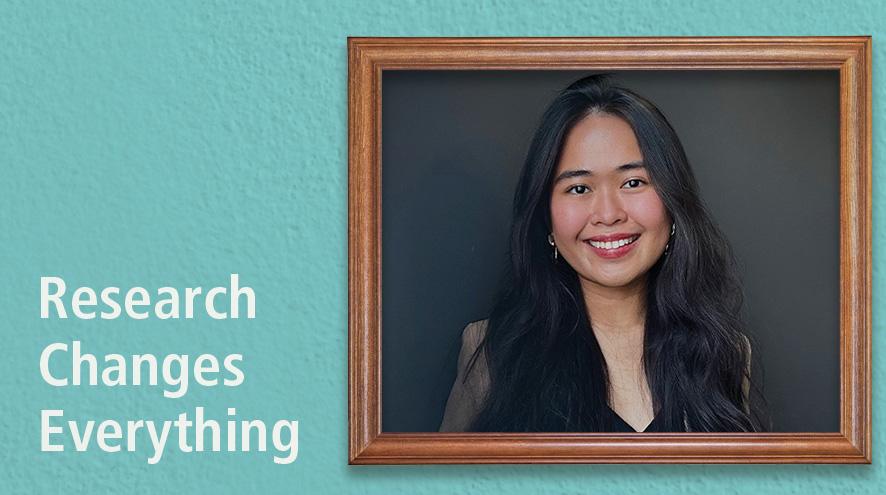New App for Care Partner Mental Health
We talked with Louise Castillo, a researcher from the University of Regina’s Health Psychology Lab, about an app her research team is developing to promote care partner mental health.

Unpaid care partners for people living with dementia have needs that are multifaceted and evolving. With more technology emerging than ever before to help track and promote wellness, navigating the space and finding a suitable option can be overwhelming and time consuming.
We sat down with Louise Castillo, a doctoral student in Clinical Psychology at the University of Regina supervised by Dr. Thomas Hadjistavropoulos and funded researcher from the 2022 Alzheimer Society Research Program, to discuss recommendations from her team’s study: Systematic Evaluation of Mobile Applications for Informal Caregivers of People Living with Dementia.
Louise’s work is centred around pain management and assessment in individuals with dementia and improving the psychological outcomes of care partners of people living with dementia. Her team is currently in the process of developing and evaluating an app that will help address the mental health and well-being of care partners for people living with dementia.

What inspired or sparked your interest in mobile apps for care partners of people living with dementia?
In our research lab and through my research, we’ve seen big advancements in the use of technology to support older adults living with dementia. During the height of the COVID-19 pandemic, more and more options became available in the market. But when I started really looking at what was available, I noticed a huge gap in apps for mental health for care partners. With the apps that I could find, there wasn’t a lot of information to see if they really worked.
As someone who’s training to be a psychologist, I think that mental health is such a big piece to care partners’ overall well-being. There are different factors that affect the levels of stress a care partner may have, depending on where they are in their journey.
“Apps can provide tools and strategies for care partners like medication management, improving social supports, juggling responsibilities, and monitoring your own well-being.”
Tell us about your research study.
The purpose of our study was to examine whether currently available apps for family caregivers of people living with dementia can help improve their stress and burden.
For our study, we wanted to hear directly from caregivers and family members. As such, a big part of the study was interviewing people with lived experience about what they actually want to see in an app designed for them.
We also conducted a review of existing apps to understand the common features available. We found that many apps included information about dementia and tools such as medication or appointment management, but a huge gap missing was in the resources available tailored to addressing the mental health of care partners.
Have any studies like this been done before?
There’s been research that looks at the needs of caregivers. We used the results of one of those studies as a criteria to categorize the features we found in the apps. However, to the best of our knowledge, this was the first study to review existing apps and evaluate apps that we identified. We wanted to fill in the gap in the lack of research evaluating existing apps.
What themes emerged during your interviews with the care partner participants in your study?
One of the most common things that caregivers in our study said to us was that it was important to them to have an app that is easy-to-use and operate. People don’t want to be flipping through many screens to get to where they need to go. They want apps that use a large, legible, and simple font, and different pictures or visual cues.
User engagement is another important area the care partners in our study identified. Most of the apps we reviewed in our study had low engagement, even though research has shown that the more engaging an app is, the more effective it can be. Apps that are more engaging allow for user feedback or enable users to do something with the information the app provides.
Caregivers from the study also noted the need for tailored content towards specific groups of care partners. For example, a young carer pursuing post-secondary education or a career may require different resources than a retired person who is caring for their spouse.
Another theme that emerged from the study was the need for app developers to incorporate the voices of people with lived experience and to take the multidimensional aspects of caregiving into account.
“One of the biggest things I’ve learned with having care partners involved in our research is that care partners are the experts. They are the ones who really know what should be there in the first place to help address their needs. It’s important to include them in projects from the very beginning.”
Tell us about the app your team is currently developing.
Along with a caregiver partner, we are working to develop an app that addresses the stress and mental health of care partners of people living with dementia. We are working with app developers at the University of Regina to create the app. The app will help address the gaps that were identified in our review and will include features based on our interviews with participants.
Our app will provide different information and activities for caregivers to use to manage their stress. It will also feature tips on how to stay connected with people and how care partners can use their strengths to manage their stress. We hope that the app will empower care partners to recognize when they’re feeling unwell, when stress is building up, and when to seek support.
“The app we are developing is a self-contained app. We will not be collecting any data from the app or sending any user data to a server. Privacy was an important consideration for us in the app that we’re creating.”
The app is called UR CAREGIVER app and we hope to test its feasibility this summer with a small group of care partners to finalize the app. Then, we’ll do a bigger evaluation to receive more feedback from care partners.
Additionally, we’re in the process of making a video-tutorial to help people use our app once it is released.
Is there anything else you would like mobile app users to know?
When researching and selecting an app, check to see if the app developers have disclosed any security measures in place and if the app has a privacy statement. Having a privacy statement can show greater transparency from the developers.
Is there anything you would like other researchers to know?
I am grateful for the research funding from the Alzheimer Society Research Program. For research trainees, I think that the Alzheimer Society Research Program is such a great opportunity to help improve the lives of older people living with dementia. It is a great opportunity for trainees to get your PhD research funded and be supported through your training to hopefully help others.
There are so many wonderful trainees in this field. It is a very exciting time!
Learn more about the Alzheimer Society Research Program, including funding opportunities for researchers and highlights from other previous funded research studies.
Read the published article from Louise Castillo’s research team: Are mobile apps meeting the needs of caregivers of people living with dementia? An evaluation of existing apps for caregivers
